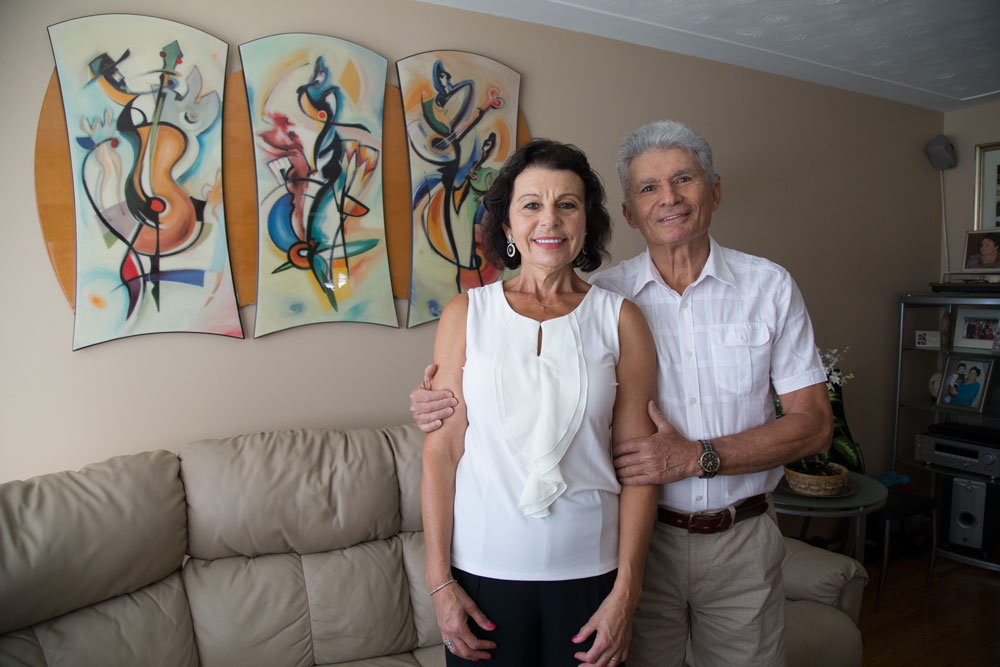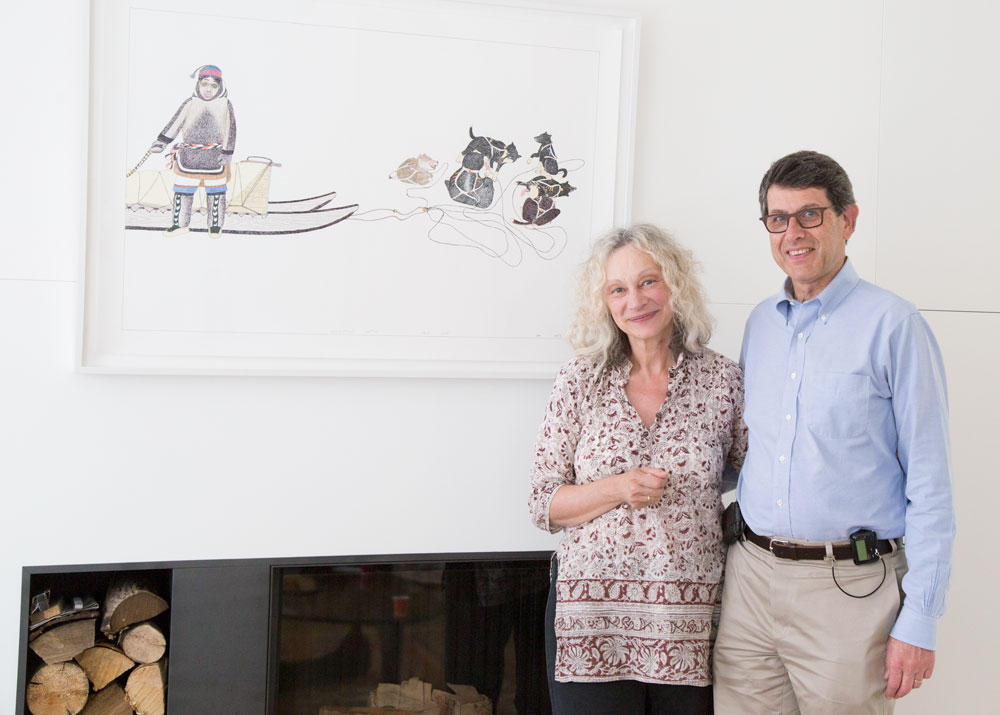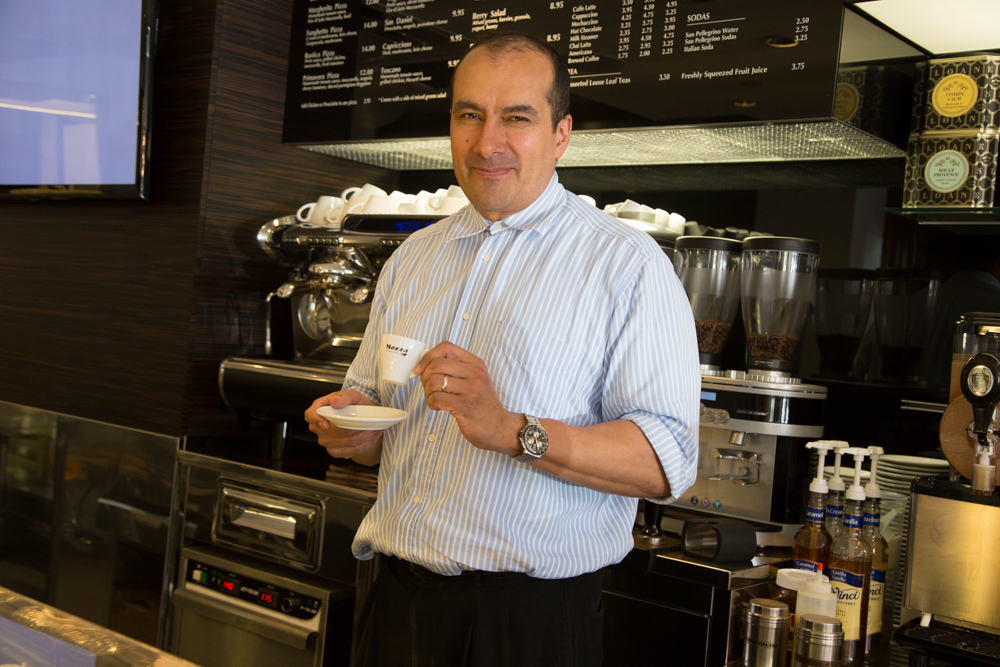September 2016
by Wendy Schneider
What brought you to Hamilton? That’s the question at the heart of a new series that highlights the stories of newcomers to our community in advance of an upcoming exhibit on the same topic at Beth Jacob’s Rosenshein museum. Over the next four issues, the HJN asks some of these individuals and families why they left their places of birth, why they chose Hamilton, what challenges they faced, and what they most appreciate about living in Canada. These are their stories.
Leon and Diana Karan
Immigrated from: Belarus
Arrived in Hamilton: November 1991

Who came: Leon and Diana Karan, their daughter Ilona, 16, son Steve 11, and Leon’s elderly father, Guessel.
Why they left: Diana and Leon Karan were the last members of their extended family to get out of the Former Soviet Union (FSU). Diana said that for years she was in a constant state of fear after an incident in which a man followed her daughter from school, picked up the young child and said “Oh, you’re a Jewish girl.” Being refused permission to accompany her high school students on a class trip to Paris for trumped up reasons was the final straw.
Obstacles: There was nothing straightforward about the Karans' departure beginning with the day Canadian embassy officials informed Leon that the family’s immigration application had been accepted, but his father, who was not a blood relative of the sponsor, Diana’s aunt, would have to remain behind. “I’m not leaving my 80-year-old father alone. He has nobody here,” Leon told the consul general after refusing to leave the building until he’d had a chance to make his case. “He said, ‘You’re the first one who refused to leave his parents behind. I’ll see what I can do.’ So Leon came back the next day and his father got a minister’s permit to come,” said Diana.
Standout memory: Being served strawberries and bananas. “In November!” she said. “something that we never saw in Belarus.” The warm welcome the family received from Hamilton Jewish Social Services director, Carol Krames made a lasting impression. “She welcomed us with open arms. Her help was just unforgettable,” said Diana, “and this is why we’re trying to give back to the community because we always remember the help we received.”
Successes: Diana heads the ESL department at Columbia International College. Leon, an award winning music educator, studio owner and a sessional instructor at McMaster University, is a devoted volunteer at Jewish Social Services, where he conducts the Chai Choir. Ilona sings with the Canadian Opera Company and Steve is vice president of logistics at Bell Mobility.
What Canada means to her: “It means to have my family safe. It means that my children could achieve what they have achieved,” said Diana. Every Canada Day, she gets a phone call from her son Steve. “Thank you,” he tells them, “for bringing me here.”
Nadine and David Koff
Immigrated from: France
Arrived in Hamilton: 2008

Who came: Radiologists Nadine and David Koff and their three sons moved to Toronto in 1998 when the couple accepted fellowships at that city’s University Health Network.
Why they left: According to David, the couple’s primary reason for coming to Canada was to find venture capital for a business the couple envisioned creating that would allow doctors to send xray results over the Internet, then in its early days. Nadine, however, had other reasons for coming.
“I was really afraid of the rise of the far right and anti-Semitism,” she said, recalling an incident at her son’s school in which a professor told Jewish students if they didn’t work harder, they’d be sent back to the gas chambers. “It was really shocking,” she said, “and what was more shocking is that the director of the school didn’t do a thing. She just said, ‘Anyway Jews are cowards so the parents won’t complain.’” David, whose Eastern European parents immigrated to France before the Second World War, explained that France’s Ashkenazi community has always kept a low profile. Growing up, he said, “We never dared to say in a conversation that we were Jews.”
Challenges: Starting a business in Canada was more difficult than the Koffs had imagined. “We didn’t realize that our banking history was not relevant anymore. Everything was different,” she said. “We had no line of credit, no overdraft ... and we had to make the payroll. Sometimes there’s nothing left for you,” said David. Most difficult of all, said Nadine, was not being able to afford to travel to France as often as they wished to visit their aging parents. “David lost both parents. I lost my father. The kids didn’t see them much,” she said, sadly.
Successes: The company the Koffs envisioned has grown into Real Time Radiology Teleradiology Services, over which Nadine presides. David is chief of diagnostic imaging at Hamilton Health Sciences and chair of the department of radiology at McMaster University. The Koffs’ three sons inherited their parents work ethic and are all thriving. Their eldest son, a software engineer and youngest son, who works for Google, live in California.Their middle son, a successful architect who designed the couple’s beautiful Ancaster home, lives in Toronto.
Thoughts about Canada: “It’s an oddity in this world, a wonderful oddity,” said David. “It’s wonderful. We are so glad to be here,” said Nadine.
Alon Coret
Immigrated from: Israel
Arrived in Hamilton: 2005

Who came: Alon Coret,10, his sister, Michal, eight, and their parents Andu and Judith.
Why they left: Alon’s parents came to Toronto on radiology fellowships in 2003. Their intention was to return to Israel in two years.
Challenges: When both Alon’s parents were offered positions at St. Joseph’s Hospital, they decided to move to Burlington. The move was hardest on their teenage son. “It wasn’t an easy transition,” said Alon. “Today the issue is more the impact of juggling this idea of being a dual citizen ... Oftentimes it translates into sort of feeling a little bit out of place in both places. I’m definitely not a tourist when I go to Israel but I’m also aware of the fact that I’m not from here either. It’s not like you can just give up another part of who you are.” The question of whether to return to Israel once he reached army age weighed on Alon considerably. During Israel’s war with Hamas in the summer of 2014, he made a point of returning to volunteer with Magen David Adom. “I felt that was a duty being served ... just being there and participating in this nation wide sort of family struggle.”
Turning Points: Alon found the sense of belonging which had eluded him during high school at McMaster University where he was active with student groups Hillel and Israel on Campus. “I didn’t think of (not having Jewish or Israeli friends in high school) as anything that was lacking but then going to Mac, I realized that I did want that kind of community and I’m very happy to have found that Jewish family in Canada.” Getting accepted into the University of Toronto medical school was another turning point. “It was a big thing that I worked hard towards for so long and I really appreciated being given such an incredible opportunity.”
Thoughts about Canada: “Israel’s my childhood. As an Israeli and as a Jew I relate to it as a place that needs nurturing. No matter where you are in the world ... that part of you is always there.” Here in Canada, however, “there’s a sense of calm and sanity here that you really almost don’t find anywhere else. I open my phone every morning and see some new development in the world, some other horrific act of violence that seems to be sparked for no reason ... It’s an oasis of calm and peace here.”
Charles and Michele Schneider
Immigrated from: South Africa
Arrived in Hamilton: 1986

Who came: Charles and Michele Schneider, their 18-month-old toddler Lawrie and expecting Evan.
Why they left: Charles was offered an opportunity to open a telex franchise in Hamilton. They also were seeking a better future for their children away from apartheid South Africa.
Challenges: With Telex technology on its way out, Charles ended up selling his business. Over the next several years, he would try his hand at a number of different ventures. “I can tell you that out of the 30 years we’ve been here it’s only the last 10 years that we’ve taken steps ahead,” said Charles. “For the first 20 years here, let me tell you, it was tough.” For Michele, the most difficult part of their first years in Canada was being isolated at home with a toddler and a newborn. “We didn’t feel as though we were making it,” she said.
Turning Points: Michele’s sense of isolation disappeared as soon as she began meeting other young mothers at her children’s pre-school. Additionally, the influx of other South African families into Hamilton throughout the 1990s gave the Schneiders a new extended family with whom to share Shabbat dinners and Jewish holidays. The Jewish Community Centre, where Michele found work as a program director and Charles coached indoor soccer, also played an important role in their acclimatization. “A lot of people got to know us,” said Charles.
Standout memory: The time their son, Evan came home from school complaining that the girls in his Grade One class were chasing him for a kiss. When Charles asked whether the girl who caught him was pretty, Evan replied, “Yes, but she’s always dressed in black.” Her son’s reply made his mother smile. “That was his way of looking at (a child whose skin colour was different from his own), whereas we grew up, there wouldn’t be any black kids in school with you. We were segregated the whole time. To me that was the best thing we had ever done for our kid because that’s how he saw her.”
Successes: Charles has found fulfillment and financial security in the steel business, and Michele, still deeply involved in Jewish communal work, is the office administrator at Kehila. They are immensely proud of their three sons: Lawrie, a manager of strategic planning at the CBC, Evan, a second year medical school resident, and Stephen, who teaches elementary school in Milton. “It’s taken awhile to get there, but we got there,” said Michele.
Luis Meza
Immigrated from: Venezuela
Arrived in Hamilton: 2007

Who came: Luis and Ronit Meza, and their three children, aged 17, 15 and 9.
Why they left: With Venezuela descending into political turmoil and violence, the Mezas were looking for a safer future for their children.
Challenges: Starting a business in a foreign country where you have no contacts nor any familiarity with the language or the culture has taken determination and sacrifice. Luis, who had years of experience in the wholesale and retail coffee business in Venezuela, made the decision early on to stay with what he knew best. In 2011, the family opened their first Mezza Caffe in Ancaster, and a second location in downtown Hamilton’s Lister Block two years later, where Luis can be found seven days a week.When Ronit once remarked to her husband that she never imagined they’d be working this hard at this time of their lives, Luis replied, “I may be working as hard at 53 as I did when I was 20, but I think I moved up because I can’t imagine myself being back there.”
Standout memory: The time his wife started to panic when their youngest daughter, who was learning how to ride a bike, pedaled out of their view. “Ronit was panicking not because she was worried about traffic. It was a quiet street. She was worried about her being by herself ... Of course we came here looking for safety but in your day to day life, your brain can’t process that this is a safe place and you’re ok.”
Successes: The two older Meza children work in the family business: Their son, a graduate of McMaster University’s DeGroote School of Business, who recently wed a Canadian born young woman, and their older daughter, a graduate of Ottawa’s Le Cordon Bleu Culinary Arts Institute, who is their on-site pastry chef. The youngest is studying kinesiology at Western University. Since coming to Canada, Ronit received a Masters in Theology from McMaster University.
Thoughts about Canada: When all five members of the Meza family received their Canadian citizenship in February of 2015, Luis recalled feeling an enormous sense of relief. “I cannot explain the load it took off my back once we had that because there was always a fear inside me (that they’d be forced to return Venezuela) ... but once we received that, the days were brighter.”
